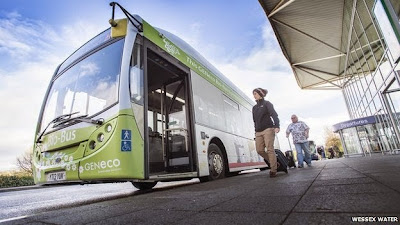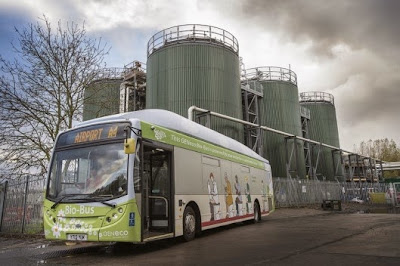“The
bus is powered by people living in the local area, including quite possibly
those on the bus itself”
GENeco spokesperson
Mohammed Saddiq from GENeco, commenting on the GENeco Bio-Bus
If
you’re one of those persons who believe that your shit is worth its weight
gold, you may be on to something.
GENeco, a sewage
processing plant company, has come up with an innovative way to process
leftover food and sewage. They're decided to see in a one of a kind experiment
to power a bus called the GENeco Bio-Bus
using Bio-Methane as described in the article “This bus runs on human
poop”, published November 24, 2014: 10:44 AM ET by Ivana Kottasova, CNN Money.
 |
GENeco Bio-Bus is
a 40-seater A4 Bus, no bigger than a typical JUTC Bus here in Jamaica, if it
were to carry only seated passengers as noted in the article “All
aboard the poop bus, now farting around the UK”, published 21 November 2014
6:30 pm GMT by Anthony Domanico, CNET News. GENeco Bio-Bus
will ply the route between the Bristol airport and the historic town of Bath, a
distance of 20km (12.4m).
They’ll
potentially be carrying as many as 10,000 passengers per annum along this well
trafficked route, as going to the Bristol Airport is a regular activity. Makes
sense too, as Bio-Methane from the people of Bath is already being used to heat
the homes of the very same residents.
UK and Bio-Methane -
10% of Britain's Heating from Human Organic Waste Alone makes shit worthwhile
Potentially, if the UK were to utilize all of
its sewage to make Bio-Methane, it could supply up to 10% of UK's heating
means, making faeces, the fancy name for shit, really worth its weight in gold!
 |
According
to GENeco:
1. 299.34
km (186 miles) is the distance the GENeco Bio-Bus can
travel on a full tank of Bio-Methane
2. 59.55
miles (37 km) is the distance one persons annual waste i.e. organic material,
faeces and urine can allow the bus to travel
Therefore
according to these figures, to fill the tank of a GENeco Bio-Bus
requires the annual waste of five (5) persons. This might sound inefficient,
but remember that the annual waste of a UK resident will be stored in liquid
form in huge Processing tanks at GENeco Sewage processing
plant; potentially they could have hundreds of years worth of British Human
waste stored.
And
that's just human waste; cows and farm animals as well as organic material from
plants i.e. grass cutting from lawns, gardens, etc and dead animals, can be
harnessed and bio-digested into methane and carbon dioxide. So this is
beginning to look more like say 50% of UK's heating needs, something the Gas
companies are sure to like or dislike, depending on how they see the efficiency
gains of Bio-Methane as well as keeping their Gas supplies domestic, so to
speak.
Clearly
this is a proof-of-concept that has huge potential, even though the News
reporting doesn’t appear to take it quite so seriously.
GENeco Bio-Bus and
Bio-Methane - Suitable replacement for LPG that can power Combustion Engines
The
GENeco Bio-Bus'
fuel, Bio-Methane Gas, is generated through the treatment of sewage. The bus'
tanks are modified to a design similar to those used by vehicles that run on
LPG as described in my Geezam blog article
entitled “Auto
LPG as a Motor Vehicle Fuel”.
 |
Typical
of any LPG Vehicle, the GENeco Bio-Bus'
fuel engine will not only burn fuel more cleanly but also more efficiently. In
fact, Bio-methane can be used in place of LPG and can potentially be used to
make running public transport more efficient as argued in my blog article
entitled “JUTC
faced PAAC on Wedneday September 17th 2014 – JUTC Buses can’t run on ULSD as
LPG Better for the JUTC Buses Fuel Injectors”
The
reductions in Greenhouse Gas emissions are significant when compared to the use
of liquid fuels such as Gasoline and Diesel according to the article “UK's first 'poo bus'
goes into service between Bristol and Bath”, published 20 November 2014, BBC News:
1. 90%
reduction when compared to Gasoline
2. 30%
reduction when compared to Diesel
The
energy content of Bio-Methane makes is suitable enough to replace Gasoline or
diesel without a noticeable decrease in mileage as noted in my blog article
entitled “China: China
to promote LNG in Public Transport”.
So
far from being laughable, there is huge potential in using human, animal and
organic waste to make Bio-fuel, particularly Bio-Methane!
Recycling Organic Waste
- Jamaica's Bio-Fuel Revolution need GOJ support
As
my article had pointed out, using LPG is more efficient. Using Bio-Methane
appears to have similar benefits for the vehicle's engine. Already, here in
Jamaica, we've made extensive usage of our biofuel, though not human waste but
organic waste.
 |
Research
being done by Dr. Micheal Coley of the University of the West Indies in
conjunction with the NGO (Non-Governmental Organization) YCWJ (Youth Crime
Watch Jamaica) t convert waste Cooking Oil into bio-diesel as detailed in my blog article entitled “UWI
and YCWJ team up to Recycle Waste Cooking Oil - Yendi Phillipps on How to make
National Bio-Diesel Production from Waste Cooking Oil Insidious Chapter 2”
is but one example.
 |
And
that's just Cooking Oil and Bagasse. Potentially too, we can also recycle Old
Car tyres to make Gasoline on as large scale as is already being done in the
USA and St. Lucia and the Grenadines as described in my blog article
entitled “St.
Lucia’s SLSWMA to make Fuel from Tyres - Why is Jamaica not converting Tyres at
Riverton City Dump into Fuel”.
In
fact, using Solar Powered Vacuum Pyrolysis, you can convert any plastic, rubber
or even ordinary Organic material into fuel as described in my blog article
entitled “How
to make Diesel and Gasoline from the Pyrolysis of Car Tyres and Plastics -
Jamaican Riverton City Dump Fire Ecological Disaster solution that reduces
Jamaica's Oil Bill”, with additional systems needed on this process to
remove excess sulphur and Carbon for resale as a VAS (Value Added Service) from
this process
GENeco Bio-Bus
shows the potential of human shit an organic food waste. But we here in Jamaica
can process virtually any organic waste into fuel as we generate tons of
garbage daily, fuelling both our JUTC buses, motor vehicles as well as
producing Cooking Gas.
No comments:
Post a Comment